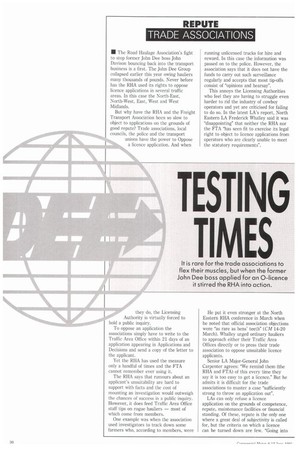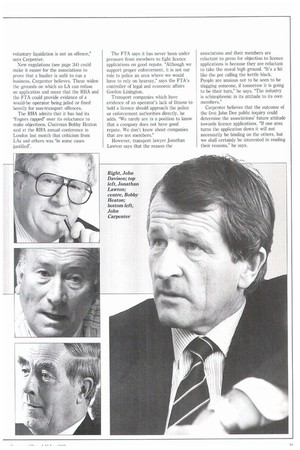TESTING TIMES
Page 32

Page 33

If you've noticed an error in this article please click here to report it so we can fix it.
It is rare for the trade associations to flex their muscles, but when the former John Dee boss applied for an 0-licence it stirred the RHA into action.
they do, the Licensing Authority is virtually forced to hold a public inquiry.
To oppose an application the associations simply have to write to the Traffic Area Office within 21 days of an application appearing in Applications and Decisions and send a copy of the letter to the applicant.
Yet the RHA has used the measure only a handful of times and the FTA cannot remember ever using it.
The RHA says that rumours about an applicant's unsuitability are hard to support with facts and the cost of mounting an investigation would outweigh the chances of success in a public inquiry. However, it does feed Traffic Area Office staff tips on rogue hauliers — most of which come from members.
One example was when the association used investigators to track down some farmers who, according to members, were He put it even stronger at the North Eastern RHA conference in March when he noted that official association objections were "as rare as hens' teeth" (CM 14-20 March). Whalley urged ordinary hauliers to approach either their Traffic Area Offices directly or to press their trade association to oppose unsuitable licence applicants.
Senior LA Major-General John Carpenter agrees: "We remind them (the RHA and FTA) of this every time they say it is too easy to get a licence." But he admits it is difficult for the trade associations to muster a case "sufficiently strong to throw an application out".
LAs can only refuse a licence application on the grounds of competence, repute, maintenance facilities or financial standing. Of these, repute is the only one where a great deal of subjectivity is called for, but the criteria on which a licence can be turned down are few. "Going into voluntary liquidation is not an offence," says Carpenter.
New regulations (see page 34) could make it easier for the associations to prove that a haulier is unfit to run a business, Carpenter believes. These widen the grounds on which an LA can refuse an application and mean that the RHA and the FTA could provide evidence of a would-be operator being jailed or fined heavily for non-transport offences.
The RHA admits that it has had its "fingers rapped" over its reluctance to make objections. Chairman Bobby Heaton said at the RHA annual conference in London last month that criticism from LAs and others was "in some cases justified". The FTA says it has never been under pressure from members to fight licence applications on good repute. "Although we support proper enforcement, it is not our role to police an area where we would have to rely on hearsay," says the PTA's controller of legal and economic affairs Gordon Linington.
Transport companies which have evidence of an operator's lack of fitness to hold a licence should approach the police or enforcement authorities directly, he adds. "We rarely are in a position to know that a company does not have good repute. We don't know about companies that are not members."
However, transport lawyer Jonathan Lawton says that the reason the associations and their members are reluctant to press for objection to licence applications is because they are reluctant to take the moral high ground. "It's a bit like the pot calling the kettle black. People are anxious not to be seen to be slagging someone, if tomorrow it is going to be their turn," he says. "The industry is schizophrenic in its attitude to its own members."
Carpenter believes that the outcome of the first John Dee public inquiry could determine the associations' future attitude towards licence applications. "If one area turns the application down it will not necessarily be binding on the others, but we shall certainly be interested in reading their reasons," he says.




































































































